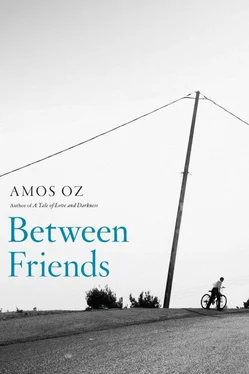The sky was purple-black and the clouds being pushed along by the wind looked heavy and dark. The entire kibbutz was deeply asleep. The fence lights painted pale yellow puddles. One of the lights, apparently about to die out, blinked as if in hesitation. Yoav stepped quietly through the shadows of the bushes and circled the hay barn, mud caking his shoes. You’re so blind, he whispered to himself hopelessly, you’re blind and deaf. He remembered the way Nina had leaned toward him when he promised to find her a room for the night and took his hand in hers and pressed it against her breast. You should have understood her intention and taken her in your arms. She was giving you a signal and you ignored it. And she gave you another hint in the office when she touched your shoulder with her fingertips, and you ignored it again.
His legs carried him across the square in front of the recreation hall and past the children’s house on the way back to the kibbutz office next to the bus stop. He crossed the lawn in front of the dining hall. As if in a dream, he stopped and stood in front of the office window. Had she fallen asleep without turning off the light? Or was she still awake? On tiptoe, he approached the window and peered inside. Nina was lying on the bench covered with the woolen blankets he’d brought her, her blond head resting on the pillow, open eyes fixed on the ceiling. If he were to tap lightly on the window, she would startle and he didn’t want to alarm her. So he backed away quietly and stood there, the rifle slung over his shoulder, among the cypress trees in the darkness. And asked himself, but got no reply.
He could just knock on the door, go inside, and say, I saw that the light was still on and only came in to see if you need anything. Or: I came in to check that you’re not cold. Or: I came in to see if you feel like talking for a while. All this time, she’s been lying there on the other side of the wall with her eyes open, he thought, and maybe you’re what she’s waiting for and it’s two in the morning now and the entire kibbutz is asleep.
He went back to the lit window, his hat down over his ears, head jutting forward, glasses glittering faintly in the dark as the light reflected off them, his heart going out to her but his legs planted firmly in place. Hadn’t he been waiting all these years for just this moment? So why, instead of bursting with daring or passion, was he filling up with a vague sense of sadness? Then he walked silently around the building and stood for a while at the door, listening as hard as he could, hearing only the wind gusting through the pine needles. Finally, he sat down on the step in front of the door, pulled his hat even further down over his ears, and waited. He sat like that for about half an hour, feeling that something was almost becoming clear to him, but what that something was, he didn’t know. A jackal cried from the darkness beyond; others answered it with a despairing sound from the direction of the orchard. He raised the rifle, his finger found the trigger, and only with the last vestige of his rational mind did he resist the urge to fire a long barrage into the air and tear the silence apart.
At three thirty, he stood up and went to wake the dairy workers for the predawn milking. Then he did a last check along the fence and crossed the square back to the dining hall to turn on the electric samovar for the early-morning shift. The sun wouldn’t rise until after six, and his guard duty ended at five. He still had to walk among the houses and wake the people whose names appeared on the list he had in his hand. There was no point in waiting for sunrise because it would most likely take place behind the mass of thick clouds. He had to go home now, shower, lie down, close his eyes, and try to sleep. Tomorrow, something might finally become clear to him.
IT WAS A sweltering, oppressive day. A low, dirty gray sky hunched over us as if the desert had risen up and spread out upside down above the roofs of our small houses. The air was filled with fine dust that mixed with sweat and covered foreheads and arms with a sticky layer of whitish mortar. Henia Kalisch, a widow of about fifty, went into the bathroom during the lunch break, took off her work clothes, and stood for a while under a torrent of cold water. Her lips were always tightly clenched and two bitter lines stretched from the corners of her lips to her chin. Her body was as angular and flat as a boy’s and her legs were crisscrossed with blue and pink veins. The cold water washed off the dust and refreshed her skin, but did not allay the sense of malaise. After her shower, she toweled herself brusquely, dressed again in her gray work shirt and navy-blue work trousers, then walked resolutely back to her shift in the kibbutz kitchen. That very evening she planned to talk to Yoav Carni the secretary, David Dagan the teacher, Roni and Leah Shindlin, and a few other influential members of the kibbutz in an effort to drum up support for the vote at the general meeting on Saturday night.
On the back porch of the kitchen, bathed in sweat, they sat on stools across from each other peeling vegetables and slicing them into a large pot, and Brunia said to her, “There’s no point in bringing that up at the meeting, Henia. They’ll bite your head off.”
Henia said, “But it’s good for everyone. The kibbutz’ll be able to shorten the waiting list for college.”
Brunia chuckled. “Your Yotam has no special standing here. No one does. Except for the select few.”
As she pushed away the pile of peelings and put a new crate of vegetables between them, Henia tried to sound out Brunia: “But at least you, Brunia, you’ll vote for Yotam’s request at the Saturday night meeting, won’t you? You’ll support us, right?”
“Really? And why should I vote for him? When my Zelig asked to work in the vineyard six years ago, did you support him? You all voted against him. All you hypocrites and paragons together. Then you spoke so nicely at his funeral.”
Henia said, “The pot is already full. We need to start a new one.” Then she added, “Don’t worry, Brunia. I have a very long memory, too. A very, very long memory.”
The two widows continued peeling and cutting vegetables in total silence, their knives glittering.
After work, Henia Kalisch returned to her apartment, showered with cold water again, shampooed her graying hair, and this time dressed in her after-work clothes — a beige blouse, straight cotton skirt, and lightweight sandals. She had coffee, cut two pears into slices exactly the same size and ate them slowly, washed her cup and plate, wiped them, and put them in the cupboard. The windows and shutters were closed against the blazing heat and the curtains were pulled tightly shut. The room was dark and cool, a pleasant clean smell rose from the washed floor tiles. She didn’t turn on the radio because the arrogant voices of the news announcers made her angry: They always sound as if they know everything, and the truth is that no one really knows anything. People don’t love each other anymore. At first, when the kibbutz was founded, we were all a family. True, even then there were rifts, but we were close. Every evening we’d get together and sing rousing songs and nostalgic ballads till the small hours. Afterward, we went to sleep in tents, and if anyone talked in their sleep, we all heard them. These days, everyone lives in a separate apartment and we’re at each other’s throats. On the kibbutz today, if you’re standing on your feet, everyone is just waiting for you to fall, and if you fall… they all rush to help you up. Brunia is a monster and the whole kibbutz is right to call her a monster.
In her mind, Henia wrote a letter to her younger brother Arthur, who’d been living in Italy for a few years now and had become rich from his business there. She didn’t know the nature of that business, but, putting two and two together, she thought it had something to do with spare parts for machines that manufactured weapons: in 1947, on the eve of the War of Independence, Arthur had been sent to Italy by the Haganah, with the consent of the kibbutz, to purchase arms for the underground and machines to manufacture light weapons for the nascent country. After the war, he stayed in Italy, and ignoring the anger of the kibbutz members and the general meeting’s condemnation, he settled down in a suburb of Milan, where he began to spin the web of his shadowy business. In 1951, he sent Henia a picture of himself with his new wife, who was fifteen years younger than he was, an Italian girl who looked soft and a bit mysterious in the photo because her thick black hair covered her eyes and she was hiding one of her cheeks with her hand. Several times, he’d sent Henia small gifts.
Читать дальше












